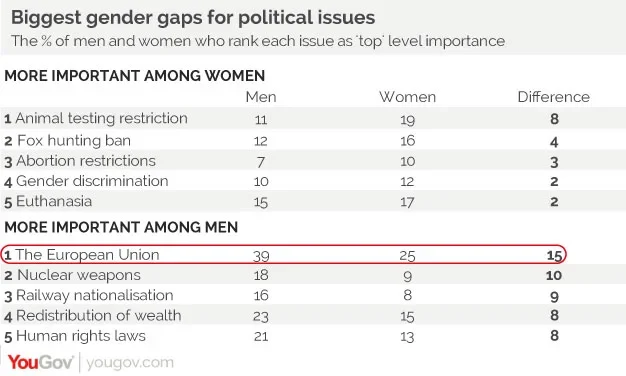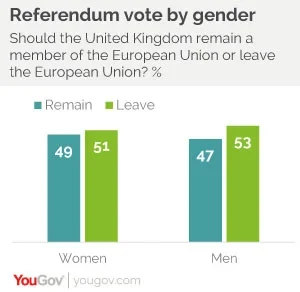New data from YouGov Profiles reveals that ‘banging on about Europe’ is more of a man’s thing, and voters may have had enough
With female candidates currently the frontrunners for potential new leaders of both the Labour and Conservative parties, there is a prospect of a new wave of female leadership in parliament. Might their dominance be more than just a coincidence?
A new YouGov Profiles analysis of data from over 50,000 people reveals that there may be something about this post-referendum moment that might make women leaders particularly welcome.
On most political issues, there is remarkably little difference between men and women. If you look up the detailed tables from most YouGov polls, there will be dramatic differences in opinion between age groups, regions, social class and political affiliation, but normally very little difference between men and women. Only when it comes to sending British troops into battle do you start to see a real difference – in the run up to the decision on Syria for example, men were in favour of intervention and women were against.
However, the two sexes do give different importance to different issues. We did an analysis of YouGov Profiles data, across more than 50,000 members of the YouGov panel, who over the past year have told us how important different political issues are to them. At this kind of sample size, even a small difference is statistically significant – the fact that 17% of women think that euthanasia is a top issue for example, compared to only 15% of men, may not sound a lot but it does mean that euthanasia is given significantly more thought and attention by women than men.
Of 50 political issues, we pulled out the five that are particularly male concerns, and the five that are particularly female concerns. And guess what came top of the male concerns, by a huge margin? The European Union. This is not only slightly but massively more of a man's obsession - 39% of men class it as a top issue, compared to only 25% of women. No other issue comes close in the level of gender disparity.

Of course you have to be careful with this kind of analysis not to play to gender stereotypes – and obviously there are many millions of women who are passionate about Britain’s place in or out of the EU – but this seems significant. Women voted slightly but significantly more to Remain in the EU than men (they voted out by 51-49 instead of 53-47) but this is not the important difference.
Rather it means that, across the country, at dinner tables and in pubs and at family gatherings, the people most likely to be ‘banging on about Europe’, getting hot-headed and red-faced and risking ruining the party, have been men.

The referendum campaign is not thought by most Remainers or Leavers to have been a very happy or edifying moment – even passionate advocates on either side will concede that it divided families and caused great anxiety. The faces stirring it up on the television and in the newspapers each day were overwhelmingly male – David Cameron, Alan Johnson, Gordon Brown, George Osborne versus Nigel Farage, Boris Johnson and Michael Gove. The whole thing was something of a boys’ mess.
In recent days, YouGov polling has revealed some surprise about-turns in voter sentiment since the referendum campaign. Boris Johnson, for so long the darling of the Tory grassroots, was suddenly seen as less desirable than Theresa May, the dour Home Secretary, and has now bowed out; even Jeremy Corbyn’s place in the hearts of the Labour membership suddenly seems in grave jeopardy. There is a real sense that the figures associated with this campaign are damaged goods.
These kind of effects are subtle and subconscious, and vie with many other competing influences. But there would be a certain poetry to party members, having had enough of men ‘banging on about Europe’ and the divisions it has caused, electing women on both sides to perform the task of bringing the country back together.





